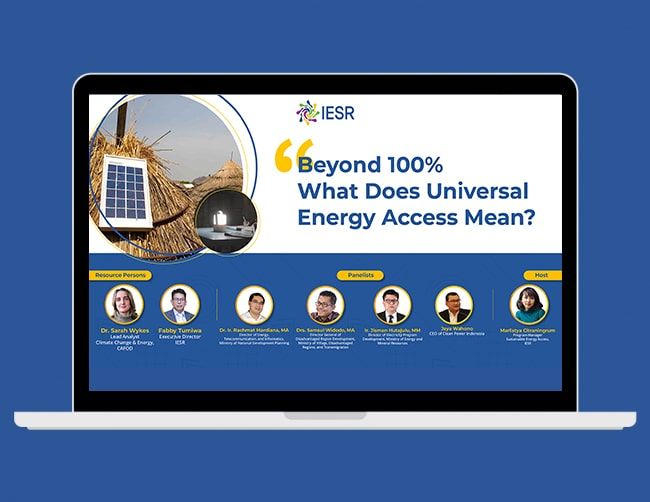In May 2020, The World Bank (with several agencies) issued a report on global energy access status Tracking SDG 7: The Energy Progress report 2020. In this report, highlights for Indonesia include significant developments on three main targets: availability of electricity (based on electrification ratio) and clean energy for cooking, utilization of renewable energy, and energy efficiency. Based on IESR’s analysis, this good development should be considered with several notes. Energy access is often narrowly interpreted as a connection to the grid, access to LPG distribution networks, or the availability of basic lighting. However, regarding energy as essential services, it should be able to contribute to poverty alleviation, economic growth, and general development agenda. Beyond the basic needs for daily activities, that often tend to be consumptive in nature, the provision of energy is a driving force for productive activities; whether on a household scale, in the case of small and medium enterprises, and on a large scale. Access to energy is also important for education and health services. With better education and health, more windows of opportunity are opened, including opportunities to get a job or to entrepreneurship.
In the Indonesian context, “quality energy access” has yet to enter mainstream energy discourse, for both electricity and clean cooking. With the government’s plan to achieve 100% electrification this year, it is then necessary and timely to introduce access beyond connections – as to influence future planning related to energy access. This webinar will discuss lessons learned from the international landscape on integrated energy planning that is needed, specifically to answer the gaps in considering the quality and community context to energy provision.
IESR with CAFOD held a talk in a webinar session discussing Beyond 100%: What does universal energy access mean? featuring Dr. Sarah Wykes, Lead Analyst Climate Change & Energy, CAFOD and Fabby Tumiwa, Executive Director, IESR on Friday, September 4th 2020 via Zoom and published Live
Hosted by: Marlistya Citraningrum, Program Manager Sustainable Energy Access, IESR
Presentation materials:
Dr. Sarah Wykes
IESR Energy Access Webinar_04 Sep 2020_CAFOD
Fabby Tumiwa
IESR Energy Access Webinar_04 Sep 2020_IESR
Rachmat Mardiana
Presentasi - Listrik Perdesaan - Energy Delivery Model - 04092020
Drs. Samsul Widodo, MA
IESR Energy Access Webinar_04 Sep 2020_Kemendesa
Jaya Wahono
IESR Energy Access Webinar_04 Sep 2020_CPI

